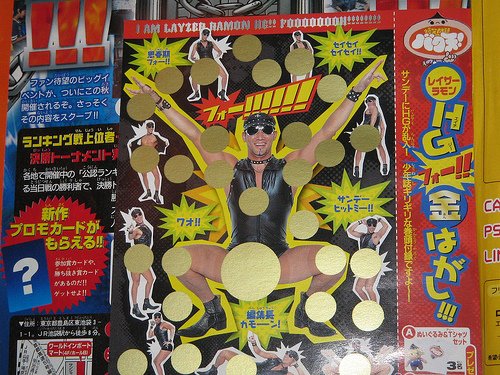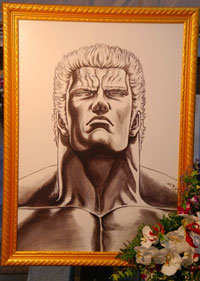No study of pop Japanology can be complete without exploring the twin concepts of giri and ninjo (義理と人情), which crop up in such varied places as classical Japanese theatre, anime and samurai and yakuza films. The words basically describe two concepts of Japanese ethics going back centuries, and form a kind of “golden rule” for how people should behave in society. Giri means “obligation” or “duty” and is used to describe the many things a person should do because it’s expected of them — for example, if someone gives you a gift, you must give a return gift worth half the amount of the original. Since attending a Japanese wedding means you generally have to bring $200 or more as a congratulatory gift, there’s a giri-based system in place to make sure fairness is preserved: when a friend who attended your wedding gets married themselves, you go to their wedding and return the cash gift, or if you can’t attend for some reason, you make some other gift worth the same amount. Ninjo translates as sympathy, humanity, or kindness, and describes the kind feelings we should have towards those less fortunate than us. Taken together, the ideas of giri and ninjo basically mean “be thoughtful and kind to others, but balance that with attention to your own various obligations in life.” While I can’t say that ninjo pops up in daily conversation in modern Japan that much, perhaps because it’s got such a hard-to-define meaning, you can find many examples of giri at work every day, such as the now-famous giri choco, so-called “obligation chocolate” that women in a company feel they must buy for their male coworkers on Valentine’s Day. A huge beneficiary of the concept of giri has been the Amway corporation, who were able to turn the tendency of Japanese to be sensitive to the obligations people might feel to friends into a $1.7 billion direct-sales market in Japan.
I’ve been seeing a lot of buzz on the Internet about mimikaki, traditional Japanese ear cleaners (often translated as “ear pick”), so I thought I’d write about that today. A mimikaki is basically a little scoop usually made of bamboo which is used to (carefully) scoop ear wax out of the ear canal. I’ll never forget the first time I saw one of these little ear cleaners — I thought it was a spoon for use in tea ceremony, to the endless laughter of my Japanese friends. Since it’s rather hard to use an ear pick yourself, a tradition of couples cleaning each others’ ears has evolved, to the point where it’s considered quite an intimate thing for a woman to do for her boyfriend, almost a non-verbal signal that she’s considering him for marriage (a girl might be shocked if a boy she’d just started dating asked her to clean his ears, for example). Just as there are certain kinds of Japanese women who are fascinated with the act of pulling whiskers out of a man’s face with tweezers (don’t ask me, it’s a long story), mimikaki fetishism may be a genetic thing, so your mileage may vary. If you’re interested in exploring the allure of traditional Japanese ear-cleaning, we’ve got several varieties of ear pick on the site.

My Japanese wife and I are funny, each very passionate about each other’s country. The other day we were eating sushi for lunch, and she suddenly waxed natsukashii (nostalgic) about a trip to Boston she’d made years ago, at how much fun it was to roam the open air markets sampling the fresh raw oysters. I’ve never been to Boston, but I recalled for her my fondness for Hakodate (ha-ko-DAH-tay), a charming city on the southern tip of Hokkaido, which is famous for its asaichi (morning open-air fish market) as well as its quaint Meiji Era architecture and one of the most beautiful night views in Japan. In general, my wife has seen much more of the U.S. than I have — she’s been to Mt. Rushmore and Green Bay, Michigan and all over the East Coast — but I’ve got her beat when it comes to places I’ve been inside Japan.
Among the many unique things J-List sells are geta, traditional Japanese footwear worn for hundreds of years. We sell many types of these cool shoes each year, and will be ramping up our selection of traditional Japanese sandals in the coming weeks. Today we’ve got a really cool pair of traditional setta sandals, made with simulated snake-pattern and form, sturdy construction for years of use.
There are many ways to plug into Japan’s popular culture, through music, anime, manga, video games — you name it. Another way you can interface with Japan is through bishoujo games, the PC dating-sim games that are a popular genre of game that lets you interact with cute anime girls as you try to win their hearts and find all possible endings in the game. One game that will be shipping soon is Doushin – Same Heart, a fresh and unique title in which you play through the eyes of the three Suruga sisters, Ryoko, Maki and Miho, experiencing the game events from their point of view and “zapping” freely from character to character to experience a new aspect of the game story, which is all the more interesting because of the strange power that the three sisters share. Beta testing on this game is nearly complete, and you can preorder this great game and get free shipping when it comes in — check it out now!

Last weekend we took our weekly (almost) trip to Karuizawa. Unfortunately we hadn’t gotten our new MPV yet so we had to take our regular car.

Along the way. This is Mt. Asama, the largest volcanoe in this area. Check out the smoke coming out of the top.

Another image of Asama-yama.

Near a waterfall there was an odd wall of ice (not related to the waterfall at all). We had no idea how this got there.

In the “ugh” category, this is comedian/former pro wrestler Hard Gay in the current issue of Jump. Scratch off the gold circles, and see if you’ve won…or be traumatized for life? (As a side note, H.G. is not actually gay.)















